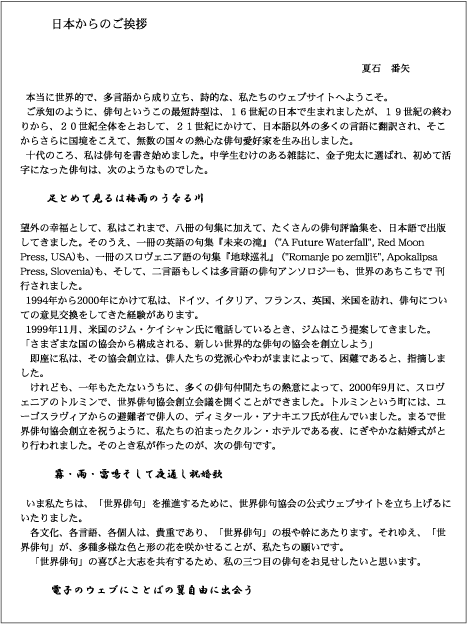|
Welcome to our genuinely world-wide, multilingual, poetic website. As you know, haiku, this shortest form of poetry, was born in Japan in the 16th century. However, since the end of the 19th century, throughout the last century, and into the 21st century, haiku have been translated into numerous languages other than Japanese, and this process has given birth to haiku devotees in countless countries beyond borders. In my teens, I began to write haiku. This is my first haiku, which was selected by Tohta Kaneko and published in a Japanese journal for junior high school students: Stop to stare To my great happiness and surprise, I have been able to publish eight haiku collections and many essays and reviews of haiku in Japanese, and moreover an English haiku collection (9A Future Waterfall,” Red Moon Press, USA), a Slovenian collection (9Romanje po zemlji” , Apokalipsa Press, Slovenia), and as well, a number of haiku published in bilingual/multilingual haiku anthologies in various parts of the world. From 1994 to 2000, I visited Germany, Italy, France, the UK, and the USA, in order to exchange opinions on haiku. When I was calling on Mr. Jim Kacian in the USA, on November 1999, Jim proposed that we inaugurate a new global haiku association composed of various national haiku associations. Immediately, I remarked on the difficulties involved in such an inauguration, in part due to haiku poets, party-spirit and egoism. But less than one year later, owing to the enthusiasm of numerous haiku friends and colleagues, on September, 2000 we were able to hold the inaugural World Haiku Association Conference in the Slovenian town of Tolmin, where Mr. Dimitar Anakiev, a Yugoslavian-refugee haiku poet resides. As if to celebrate our inauguration, on one night in the Hotel Krn (where we were staying), a lively wedding was held. On this occasion I composed the following haiku: Fog, rain, lightning We are now able to inaugurate the WHA,s official website promoting 9World Haiku”. Each culture, each language, and each individual is precious: both a root and trunk of 9World Haiku.” Because of this, it is our hope that 9World Haiku” will come to exemplify unparalleled flowers of various colors and shapes. I would like to offer a third haiku to share the joy and aspiration of 9World Haiku”: On this electric web Ban,ya Natsuishi
|
||
|
About WHA ... News ... Poetry ... Haiga ... Links ... Contact ... Archive |
||
Copyright © 2001 World Haiku Association. All rights reserved. |
||
